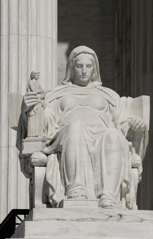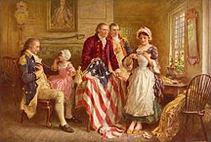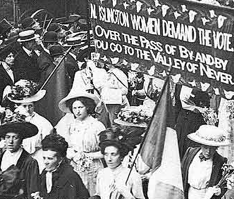“With Liberty and Justice for All:” The Quiet Strength of America: The Woman Voter (Part 1)
 Outside the U.S. Supreme Court, the Goddess of Justice contemplates as she holds another female figurine that is blind folded. Throughout the world, this image is repeated in front of Courthouses and Government buildings: a blindfolded woman holds up scales, underdetermined which way they will tilt. It is the image of fairness in the Justice System and in governing. Like with fairness, liberty is depicted by a woman in America with The Statute of Liberty. She holds the torch as if to light the way, for those who crossed the Atlantic Ocean to a better life. During American’s early years, she was the beacon of “Welcome” as they entered the U.S. for the first time. She evoked a safe haven and was seen as the welcoming ambassador for those seeking freedom from persecution, then and now. These Greek goddesses, as used around the world, evoke the same thoughts as in America: justice, liberty, and courage.
Outside the U.S. Supreme Court, the Goddess of Justice contemplates as she holds another female figurine that is blind folded. Throughout the world, this image is repeated in front of Courthouses and Government buildings: a blindfolded woman holds up scales, underdetermined which way they will tilt. It is the image of fairness in the Justice System and in governing. Like with fairness, liberty is depicted by a woman in America with The Statute of Liberty. She holds the torch as if to light the way, for those who crossed the Atlantic Ocean to a better life. During American’s early years, she was the beacon of “Welcome” as they entered the U.S. for the first time. She evoked a safe haven and was seen as the welcoming ambassador for those seeking freedom from persecution, then and now. These Greek goddesses, as used around the world, evoke the same thoughts as in America: justice, liberty, and courage.
 America has seen women undergo a development of great strength, a revolution if you will. During the initial settlement of America, it said that Abigail Adams often reminded her husband to not forget the females and their rights when drafting the documents that would procure freedom and rights for the new citizens of America. Yet women, who were involved in the settlement of this country, were not granted the same rights given to their husbands and leaders who penned the documents of freedom and laws. It is not clear as to whether the exclusion was a means to protect women or to carry on the tradition of seeing them as an extension of their husbands. Nevertheless, these documents that are the nexus of American freedom did not extend to women. Yet women were the quiet strength, and they took part in their contribution by creating symbols that depict the strongest sense of pride of patriotism to this day. One particular symbol that Americans are jingoistic about is the American Flag or Old Betsy as it is often referred to. Although there are variations of the story on how Betsy Ross came to be the creator of the flag, she was commissioned by General George Washington, as many historians have documented. It was during that time that George Washington and others sought to display a flag at their first convention. Some accounts state that Ross made some changes on the stars and colors, and in fact she determined the shaping of the five star, as opposed to the six pointed star wanted by the men, was a better decision. The reasoning she gave was a simple and a more practical solution to the flag’s construction, from a woman’s point of view. Whether or not this is true, all agree that the U.S. flag is the symbol that evokes the most true and heartfelt ache of patriotism during funerals of fallen heroes, on the Fourth of July, and during war time. It is the most recognized symbol of America throughout the world.
America has seen women undergo a development of great strength, a revolution if you will. During the initial settlement of America, it said that Abigail Adams often reminded her husband to not forget the females and their rights when drafting the documents that would procure freedom and rights for the new citizens of America. Yet women, who were involved in the settlement of this country, were not granted the same rights given to their husbands and leaders who penned the documents of freedom and laws. It is not clear as to whether the exclusion was a means to protect women or to carry on the tradition of seeing them as an extension of their husbands. Nevertheless, these documents that are the nexus of American freedom did not extend to women. Yet women were the quiet strength, and they took part in their contribution by creating symbols that depict the strongest sense of pride of patriotism to this day. One particular symbol that Americans are jingoistic about is the American Flag or Old Betsy as it is often referred to. Although there are variations of the story on how Betsy Ross came to be the creator of the flag, she was commissioned by General George Washington, as many historians have documented. It was during that time that George Washington and others sought to display a flag at their first convention. Some accounts state that Ross made some changes on the stars and colors, and in fact she determined the shaping of the five star, as opposed to the six pointed star wanted by the men, was a better decision. The reasoning she gave was a simple and a more practical solution to the flag’s construction, from a woman’s point of view. Whether or not this is true, all agree that the U.S. flag is the symbol that evokes the most true and heartfelt ache of patriotism during funerals of fallen heroes, on the Fourth of July, and during war time. It is the most recognized symbol of America throughout the world.
In 1787, the U.S. Constitutional Convention allowed states to decide voting rights to extend to women. However, all of the states voted against it except for New Jersey, but shortly thereafter, this right was reversed in this state and women fell short in having a voice in government once again. Even at this time, States were flexing their strength in procuring rights for their residents without the intrusion of the Federal Government. In fact, The Tenth Amendment did not grant states their own right to regulate until 1791, but as stated previously, states were a strong voice when trying to give women access to voting.
Women transitioned from an unheard voice to that of great strength for America, from 1868 until 1920. It was during this string of years, that women gained the right to inherit property, keep their wages, file for divorce, and finally the right to vote. Yet all of this came with the heavy price of being ostracized from society because of their civil disobedience. The more restricted the rights became, the more tenacious women became about seeking a solution. For instance, they met in small sewing groups or tea time groups where they organized themselves into powerful bodies of social change. These groups were formed where women discussed everything from family, history, daily gossip, and politics. These groups grew in numbers and were quiet in their challenging laws they saw as restrictive, yet as they gained in numbers and confidence, their defiance increased as did their voice. States like New York, Indiana, Maine, Missouri, and Ohio allowed women to keep their own wages about this time. Women halted their strife during the Civil War, but when they saw that the granting of freedom to slaves in 1869 by way of the 15th Amendment also afforded them the right to vote, women began to gain momentum in their stride for a more equitable voice in their country.
In 1893, Colorado was the first state to grant women the right to vote. Soon others like Utah, Idaho, and California soon followed. These States granted female citizens rights that the U.S. Government did not see as essential or purposeful at that time. Susan B. Anthony and others joined in large amounts to procure strength and camaraderie for their suffrage movement. Finally, in 1920 after various protests and meetings, the 19th Amendment was passed granting women the right to vote. The Amendment states: "The right of citizens of the United States to vote shall not be denied or abridged by the United States or by any State on account of sex."
 History shows us that women will be tenacious for a law that is equitable and fair. The right to vote and partake in electing leaders is a freedom that is pinnacle to shaping the America we now seek to advance and protect. Moreover, when laws are contrary to what women see as unjust, they will look for solutions that will slowly chisel away the strength of their existence until a resolution is implemented. Women have been demanding RESPECT, long before Aretha Franklin sang the chorus to make that mantra famous for all occasions. The methods women have been ensuing are crafty and intelligent. They formed groups of “similarly minded” individuals, or Rescuers, who took the leadership role and risked their lives, at times, to voice their concerns for other women in similar situations. These Rescuers saw the motions to shake up the establishment by echoing the desire to be equal, at least in political power.
History shows us that women will be tenacious for a law that is equitable and fair. The right to vote and partake in electing leaders is a freedom that is pinnacle to shaping the America we now seek to advance and protect. Moreover, when laws are contrary to what women see as unjust, they will look for solutions that will slowly chisel away the strength of their existence until a resolution is implemented. Women have been demanding RESPECT, long before Aretha Franklin sang the chorus to make that mantra famous for all occasions. The methods women have been ensuing are crafty and intelligent. They formed groups of “similarly minded” individuals, or Rescuers, who took the leadership role and risked their lives, at times, to voice their concerns for other women in similar situations. These Rescuers saw the motions to shake up the establishment by echoing the desire to be equal, at least in political power.




Comments
Facebook Comments
Make sure to check out the comments on Facebook.
WANTED: YOUR OLD AMERICAN FLAG
Please consider sending all worn American flags to our Stars for our Troops program. Each one that touch the lives of 50 US Veterans or Soldiers even after their flying life is done! http://www.gettysburgflag.com/StarsForTroops-AmericanFlags.php